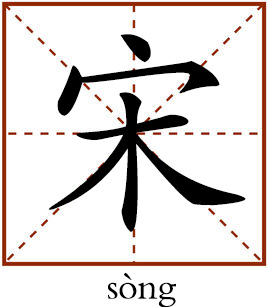Song

This character generally refers to the Song Dynasty in Imperial China. It is also a common surname.
宋襄之仁
sòng xiāng zhī rén
Songxiang refers to Duke Xiang of Song (?–637 BCE), the leader in the state of Song in the Spring and Autumn Period (770–476 BCE). Ren is one of the Confucian virtues known as benevolence. This term, taken literally, refers to the benevolence of Duke Xiang of Song.
This term was derived from a story about Duke Xiang of Song recorded in the Zuo Zhuan, or The Commentary of Zuo, an ancient Chinese narrative history. After the death of Duke Huan of Qi, Duke Xiang of Song wanted to become the next hegemon of China, so he declared war on the state of Chu. In 638 BCE, the Song army attacked the state of Zheng and met the troops from Chu, who were running to save Zheng. Instead of shocking the enemy with a surprise attack, Duke Xiang of Song ordered his army to wait for the enemy to go across the river and face off with them. Duke Xiang’s troops were thoroughly defeated and he himself was badly hurt. He soon died the following year.
The reason for the strange behavior of Duke Xiang in the war lies in the trait of the noble character that was highly regarded during the Spring and Autumn Period. As early as the Xia and Shang dynasties, ritual rules had been laid down to promote ethical and moral principles and to maintain social order, thus forming a rather complete ritual system. Individuals of each grade in the hierarchy enjoyed the type of rites assigned to their particular grade. Under the influence of the ritual culture, the aristocratic class developed a set of rules and way of behaving which a noble man was expected to follow. It was similar to chivalry in the West in the Middle Ages. During the Spring and Autumn Period, aristocratics still followed their codes of manners even in war. “Never attack your rival until they are arrayed against you” was a rule of nobility, and Duke Xiang of Song strictly followed this rule.
In modern times, this term is often used as a disapproving expression for someone blindly following virtue and morality.
edited by REN GUANHONG
